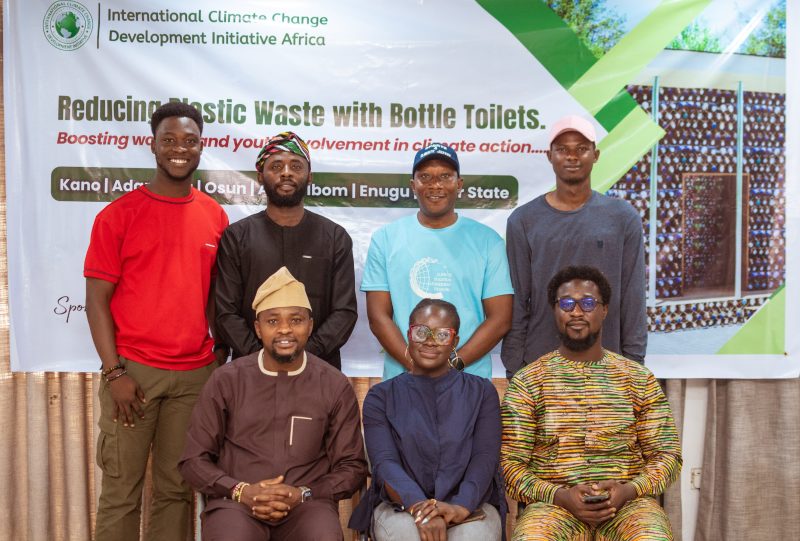The International Climate Change Development Initiative (ICCDI) has launched a project that entails the construction of toilets with plastic bottles across the six geo-political zones of Nigeria.
Olumide Idowu, Executive Director, ICCDI, while making this announcement in Lagos on Thursday, January 16, 2025, at the official launch of the project, noted that the initiative is aimed at tackling two pressing environmental and public health challenges.

Delegates at ICCDI press conference
He said: “ICCDI with the support of Canada Fund for Local Initiatives (CFLI) is proud to announce the launch of a project focused on reducing plastic waste through innovative bottle toilets.
“This project will specifically engage and empower women and youth across six states: Kano, Adamawa, Osun, Akwa Ibom, Enugu, and Niger.
“Plastic pollution is rapidly becoming one of the most severe environmental issues of our time, with millions of plastic bottles ending up in landfills and oceans each year. Simultaneously, open defecation remains a significant public health crisis in Nigeria, leading to the spread of diseases and affecting the dignity and safety of individuals, particularly women and girls.
“This project seeks to address both issues by providing sustainable sanitation solutions while involving the community in climate action,” he stated.
On the ways the project will empower women and youth across the six geo political zones, Idowu noted: “The importance of this initiative cannot be overstated, particularly in regions where women and youth play pivotal roles in community development and environmental stewardship. By actively engaging these groups, the project promises to foster a sense of ownership and responsibility towards local environmental issues.
“Apart from this, participants will receive training on how to construct and maintain bottle toilets using recycled materials. This practical skill promotes sustainability and empowers women and youth with valuable knowledge that can enhance their livelihood opportunities.
“Women and youth will be encouraged to take on leadership roles within their communities, driving the message of climate action and sanitation solutions. By nurturing these future leaders, we are investing in a generation that prioritises environmental sustainability and public health.
“The project will include awareness campaigns to educate community members about the benefits of reducing plastic waste and the importance of proper sanitation. These campaigns will be designed and executed by women and youth, ensuring that the messaging resonates with the local population.
“The anticipated outcomes of this project are multifaceted and transformative: By repurposing plastic bottles into functional toilets, we aim to significantly reduce the amount of plastic waste in the environment. This innovative approach not only addresses waste management but also enhances community sanitation infrastructure.
“The introduction of bottled toilets will help combat open defecation, leading to improved sanitary conditions. This is particularly vital for women and girls, who often face increased risks of harassment and health issues due to a lack of safe sanitation facilities.
“By fostering a sense of community involvement and ownership, the project aims to build resilience against climate change. Women and youth equipped with knowledge and resources will be better positioned to advocate for sustainable practices in their communities.
“As participants learn to construct and maintain bottle toilets, they will have the potential to create small businesses around sanitation solutions. This not only provides economic benefits but also promotes a circular economy approach by utilizing waste materials” he stated.
The ICDDI Executive Director further declared stated that November 19, 2025, a day that coincides with World Toilet Day, has been set aside as the day to concurrently commission the projects in all the six locations.
Recall that on July 18, 2024, ICCDI commissioned a six-unit toilet for pupils and teachers of Ilasamaja Primary School, Lagos. It is on this achievement the climate advocacy group has embarked on this latest initiative, ensuring that something similar is replicated across the country in order to address open defecation and plastic pollution challenges in the country.
By Ajibola Adedoye
